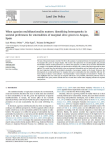Perez y Perez L., Egea P., De Magistris T. (2019). When agrarian multifunctionality matters: identifying heterogeneity in societal preferences for externalities of marginal olive groves in Aragon, Spain. Land Use Policy, 01/03/2019, vol. 82, p. 85-92.
https://doi.org/10.1016/j.landusepol.2018.11.052
https://doi.org/10.1016/j.landusepol.2018.11.052
| Titre : | When agrarian multifunctionality matters: identifying heterogeneity in societal preferences for externalities of marginal olive groves in Aragon, Spain (2019) |
| Auteurs : | L. Perez y Perez ; P. Egea ; T. De Magistris |
| Type de document : | Article |
| Dans : | Land Use Policy (vol. 82, March 2019) |
| Article en page(s) : | p. 85-92 |
| Langues : | Anglais |
| Langues du résumé : | Anglais |
| Catégories : |
Thésaurus IAMM OLEA EUROPAEA ; TERRE MARGINALE ; MULTIFONCTIONNALITE DE L'AGRICULTURE ; EFFET EXTERNE ; COMPORTEMENT SOCIAL ; SYSTEME DE VALEURS ; ARAGON ; ESPAGNECatégories principales 07 - ENVIRONNEMENT ; 7.4 - Ressources Naturelles : Paysage, Biodiversité, Patrimoine naturel |
| Résumé : | The aim of the present study is twofold. The first is the analysis of societal preferences for externalities generated by marginal olive groves in Aragon (Spain). The second is the exploration of sociodemographic and personal determinants of these societal preferences. To achieve these purposes, an online survey has been administrated to a sample of 549 Spanish individuals, and the Best-Worst Scaling with a Latent Class Model approach has been applied. The results show that individuals value environmental externalities such as biodiversity and erosion as the most important, while the sociocultural externality of governance ranked as the lowest. Moreover, the heterogeneity in societal preferences' for marginal olive grove externalities has been identified with four different classes of citizens: “socio-culturals”, “environmentalist”, “socio-ecologists” and “productives”. Finally, our study highlights that even if this type of marginal cultivation is not profitable, individuals positively value its externalities; thus, policy makers should take into account these results when designing national and regional rural policies. |
| Cote : | Réservé lecteur CIHEAM |
| URL / DOI : | https://doi.org/10.1016/j.landusepol.2018.11.052 |







